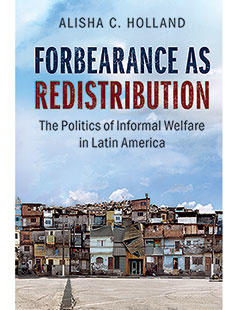Q&A: Alisha Holland ’07 on Looking the Other Way
Why ‘forbearance’ in Latin America both benefits and hurts the poor

Conventional wisdom says that when laws aren’t enforced, that’s a sign of a weak state. We might see street vendors operating illegally and assume the police force is underfunded, the bureaucracy is overwhelmed, or both are corrupt. However, politics assistant professor Alisha Holland ’07 says that isn’t always the case. In her new book, Forbearance as Redistribution: The Politics of Informal Welfare in Latin America (Cambridge University Press), Holland shows that politicians often choose not to enforce the law. She spoke to PAW about why.
What is forbearance?
I use the term to talk about intentional decisions not to enforce laws. This happens a lot with laws that the rich tend to violate, such as not paying taxes. But this book is about laws that the poor tend to violate. We often think poor people don’t have the political connections or resources to change how laws are enforced. But oftentimes, especially in developing countries, low-income groups are really important voters, so politicians end up changing how laws are enforced as a way to win elections, and more broadly, to show their support for low-income groups.
You focus on two types of violations: street vending and squatting. Why?
I focus on these violations because of their frequency and visibility. In many cities, large segments of the population use street vending as an informal form of employment. And by squatting, I mean people building houses on land they don’t own. It’s often privately owned or state-owned conservation land reserved for park or environmental purposes, on the outskirts of the city. People build these precarious houses that over time grow into neighborhoods. In many Latin American cities, one-quarter to one-half of urban development occurred through informal construction processes.
[They require] very public types of law enforcement; you have to bring in a bulldozer or the police to demolish someone’s home or take vendors out of city streets. Those can be seen as very anti-poor acts.
What are the downsides of forbearance?
I define forbearance as a revocable decision not to enforce a law, which means at any point, politicians could change their stance. That leaves violators vulnerable to the whims of politicians.
Even if forbearance helps people with housing or income, it’s not done as a formal social benefit that people are entitled to as part of their citizenship — it’s being done as a political favor. If people think of themselves as being technically in violation of the law, that could limit how they think about their place in, and participation in, politics.
Lastly, any kind of informal or illegal market tends to attract exploitative actors, like “slum landlords” or mafia bosses. A set of actors will come in and take advantage of that process, and exploit the vulnerable.
Interview conducted and condensed by Eveline Chao ’02












No responses yet